
As we reflect on recent months, HSF continues to make significant strides in advocating for justice, upholding the rights of underserved communities and making notable progress across key initiatives.
Our advocacy and litigation efforts remain central to our work, with our challenge to the termination of the Zimbabwean Exemption Permit (ZEP) continuing to have a meaningful impact.
Our policy engagements remain strong as we contribute to crucial legislative debates calling for accountability and inclusivity in democratic processes.
Through these efforts, we remain committed to defending constitutional democracy and the rule of law and invite you to engage with our work and continuing to support our vision for a just and accountable society.
 Naseema Fakir
Naseema Fakir
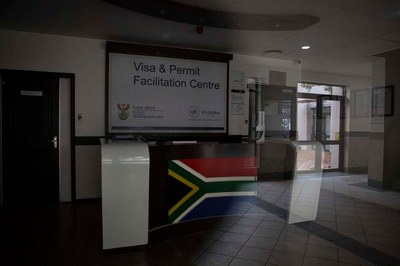 Zimbabwean Exemption Permit – Where we are Now
Zimbabwean Exemption Permit – Where we are Now
The ZEP’s Status
HSF’s successful challenge to government’s termination of the Zimbabwe Exemption Permit (ZEP) in 2022 continues to have impact in 2025. The court order that HSF secured in that matter requires the Minister of Home Affairs (Minister) to conduct a fair and rational consultation process, before he decides the ZEP’s future. In early 2024, the new Minister, Dr Leon Schreiber announced that he would establish the Immigration Advisory Board (IAB) to, among other things, assist him in properly considering the ZEP’s future in compliance with HSF’s court order. HSF participated in constituting the IAB by responding to the Minister’s call for nominations of members. In late 2024, the Minister issued a notice extending the ZEP for one year, to allow the IAB time to assist him in conducting the required process. The notice explicitly referenced HSF’s court order as the source of the Minister’s obligation to consult ZEP holders.
Notably, also in late 2024, the Minister extended the Lesotho Exemption Permit (LEP) so that the IAB could have time to properly consult regarding its future. Although the LEP was not explicitly a part of HSF’s ZEP case, the Minister referenced the legal principles laid down therein when justifying extending the LEP. This shows that HSF’s ZEP case has had significant impact beyond its intended group of beneficiaries.
HSF’s ZEP Advocacy
From the early days following the launch of our ZEP litigation in 2022, ZEP holders have flooded HSF with requests for legal assistance with everyday struggles emanating from widespread uncertainty and misinformation regarding the future of their permits. HSF began answering these requests on a small scale in 2023 and in 2024, we established formal processes that helped us streamline the reception, categorisation and, ultimately, answering these requests. We established an online form and several pro forma letters that aid ZEP holders with a wide range of legal issues. These processes have been a major success in efficiently and effectively providing basic legal assistance to ZEP holders. To date, HSF has sent well over one hundred letters that have clarified the ZEP’s lawful status to secure its holders crucial services such as access to bank accounts and driver’s licenses, as well as providing comfort to employers that the ZEP allows its holders to work in South Africa legally.
The court papers on the ZEP case can be read on this link.
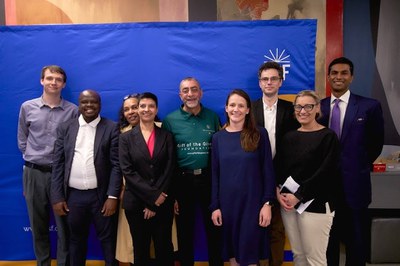 Dr Imtiaz Sooliman Delivers the Helen Suzman Memorial Lecture
Dr Imtiaz Sooliman Delivers the Helen Suzman Memorial Lecture
On 14th November, founder of Gift of Givers, Dr Imtiaz Sooliman delivered the 2024 Helen Suzman Memorial Lecture. Dr Sooliman’s address reflected on the role of civil society in South Africa through 30 years of democracy. His message was a sobering one: that corporate South Africa must be allowed to work together with government in the best interest of the country, civil society needs to continue to be more vigilant, and civil servants need to be supported. In the face of the government of national unity, he stressed the importance of having politicians who are interested in serving the people and not themselves. He further reminded South Africans that democracy is not dependent on the government only but is “dependent on all people acting together for the future of our children.” Dr Sooliman’s rally message is that the future, success, and the progress of this country depends on everyone holding hands together.
The full lecture can be viewed on this link.
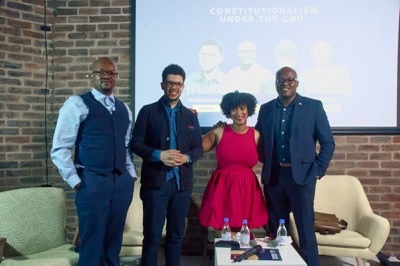 Roundtable Discussion: Constitutionalism Under the GNU
Roundtable Discussion: Constitutionalism Under the GNU
On 26th November 2024, the Helen Suzman Foundation together with our partners, Friedrich Naumann Foundation (FNF) held a roundtable discussion under the theme: Constitutionalism Under the GNU. The roundtable was held at FNF’s Thinktank at the Webber House, Johannesburg. We were delighted to be joined by esteemed panellists, Wits University lecturer and podcaster, Dr Sizwe Mpofu-Walsh, senior researcher at CASAC Dan Mafora, and Rivonia Circle director Tessa Dooms, with Khaya Sithole as the moderator. Dr. Mpofu-Walsh reflected on why he believes the new government cannot be called the GNU nor be likened with the 1994 GNU. In his reflection, Mafora defended the constitution and warned against parliamentary sovereignty as suggested by the MK Party. Dooms stated that the constitution can only achieve its promises if those in power are able to implement what it promises.
The total views for the roundtable on our YouTube page was 3300 views.
The full video on the roundtable can be viewed on this link.
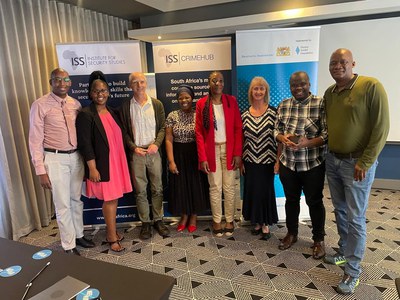 HSF at the Evidence-Based Policing Conference
HSF at the Evidence-Based Policing Conference
In November 2024, the Helen Suzman Foundation (HSF) was well represented at the 2024 Evidence-Based Policing (EBP) Conference in Cape Town. HSF’s researcher Ezekiel Kekana attended the two-day conference, organized by the Institute for Security Studies. The 2024 EBP saw academics, policing experts, and researchers discussing evidence-based methods and strategies that can be employed to curb the crime levels in South Africa. Ezekiel presented his working paper titled “Building collaborations between police and communities in rural provinces of South Africa” In his presentation, he shared with the audience the need to build community violent crime desks to deal with escalating murder and rape cases in rural provinces.
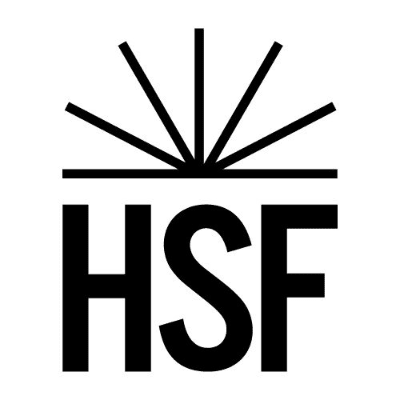 HSF Submissions
HSF Submissions
Municipal Structures Amendment Bill 2024
South Africa’s Government of National Unity (GNU) has reshaped the country’s governance landscape, ushering in a new era of coalition politics. On a local governance level, coalition government is now well established, but instability and a lack of accountability mechanisms has sparked debate on the need for reform. Midway through last year, Government tabled the Local Government: Municipal Structures Amendment Bill 2024 in an effort to address instability in local governance. The Bill proposes several reforms, introducing public coalition agreements, restricting the frequency of motions of no confidence (MONC), introducing a new category of ‘exceptional’ MONC for serious misconduct and constitutional violations, and requiring MONC votes to be carried out by a public show of hands. The Bill also excludes parties that receive less than 1% of the vote from representation in Municipal Councils. In its submission, HSF argued that restricting the form and frequency of MONC undermines their role in keeping executive authority accountable and which could lead to judicialised political disputes. HSF further submitted that the exclusion of small parties in municipal governance carries the risk of limiting political diversity and democratic franchise and raised concerns that the imposition of public votes in MONC could endanger councillors or limit their independence.
The full submission can be read on this link.
Electoral Reform
The Electoral Reform Consultation Panel (Panel), established by the Electoral Amendment Act of 2023, marks a significant step in efforts to evaluate South Africa’s electoral system and to develop reforms. In October 2024, the Panel called for recommendations on potential electoral systems for the National Assembly and Provincial Legislatures. In its submission to the Panel, HSF reaffirmed its long-standing support for a mixed member proportional system (MMP). In an MMP, at least half of the National Assembly’s MPs would be elected directly by constituencies, with the remainder being elected through proportional representation. HSF submitted that such a system would strengthen parliamentary accountability, as MPs would need to engage with their constituents consistently rather than relying on national party structures for electoral success.
The full submission can be read on this link.
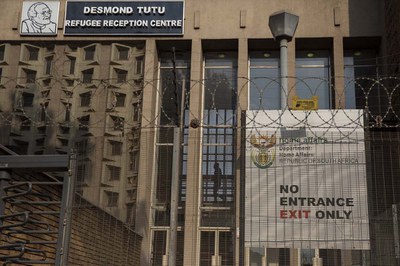 HSF Brief: Asylum Seeker Detention in South Africa
HSF Brief: Asylum Seeker Detention in South Africa
Issues surrounding migration continue to dominate political and legal spheres across the globe. As South Africa remains a popular destination for migrants from all over Africa and beyond, questions of how best to deal with this inevitable phenomenon have captivated lawmakers and civil society at large. In September 2024, HSF published a brief about developments in South Africa’s refugee protection system. The Brief explores the evolving role of detention in the asylum process in South Africa. Legislative and judicial developments to the law in this area, including the introduction of ‘good cause’ requirements and stricter penalties for irregular entry, have contributed to the use of detention as a central tool in managing asylum seekers. Whilst these measures aim to prioritise State sovereignty and border integrity, the brief argues that this comes at the expense of refugee protection, raising concerns about the accessibility of South Africa’s refugee protection system.
The brief highlights how new procedural barriers risk excluding legitimate asylum claims, ultimately criminalising venerable groups seeking protection. It further argues that an increased reliance on detention undermines South Africa’s obligations under international refugee law and calls for a more balanced approach that gives added weight to the rights of asylum seekers and refugees.
The full brief can be read on this link.
 HSF in the World Webinar Series
HSF in the World Webinar Series
Last year, in partnership with the Millenium Trust, HSF hosted a webinar-based series entitled "South Africa in the World". The three-part series covered how South Africa is shaped by international trends – but also how we can exert our own influence as an actor in global affairs.
- Our first webinar, ‘Climate Change and Migration’, dealt with the effects of climate change on migration, both within South Africa and between African countries. You can view the webinar here.
- Our second webinar, ‘International Anti-Corruption Mechanisms’ explored how international legal instruments and institutions can be used to fight and prevent corruption. You can view the webinar here:
- Our final webinar, ‘Regulating Digital Spaces’, grappled with the appropriate regulatory response to mis/disinformation spread by global social media companies. You can view the webinar here.
- The total views on our YouTube page for the three webinars was 444.

